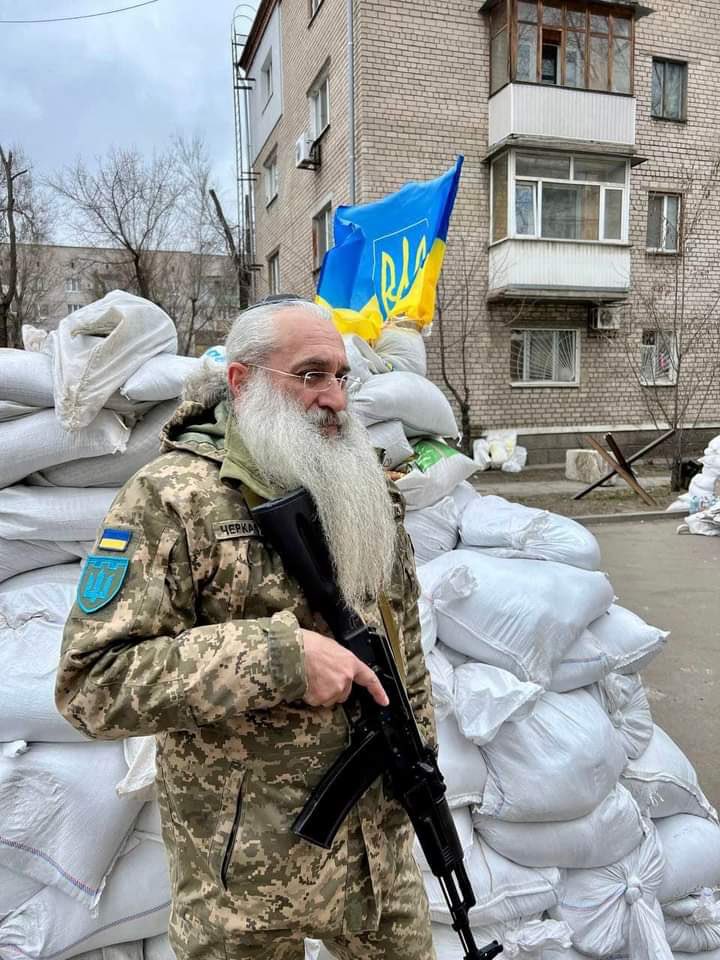
On most Friday mornings Rabbi Shlomo Baksht, the chief Rabbi of Odessa, spends the day preparing for the Shabbat. But last week in Ukraine wasn’t like the others.
“There were three powerful explosions next to the orphanage,” Baksht, who oversees three Odessa orphanages that are currently home to 250 children, told VINnews.
“The girls were very scared, they were crying. We wanted to transport the children closer to the city center, but the situation was becoming more and more dangerous,” he said, about the moment he decided to evacuate Odessa and go further west in Ukraine.
In a heroic act, the Chief Rabbi of Odessa broke Shabbat observance in order to bring 250 orphans from his city to safety in the midst of the ongoing violence. "I told them that we are here to fulfill God's will, and on this Shabbat, His will is for us to escape to save lives." pic.twitter.com/kyJLq6o054
— Humans Of Judaism (@HumansOfJudaism) March 1, 2022
On Friday morning, eight buses arrived at the Odessa orphanage to take children, staff, the rabbi and his family out of the city. Several hours later, more Russian missiles fell near the orphanage building.
“It is a real miracle that we managed to escape in time. A real miracle,” Rabbi Baksht said.
Observant Jews normally abstain from traveling or using any form of electricity from sundown on Friday to Saturday night, in observance of the Jewish Sabbath also known as Shabbat or Shabbos.
Their journey lasted through Friday night into Saturday morning, meaning Rabbi Baksht and his group spent Shabbat on the road – something Jewish law (Halacha) doesn’t usually permit.
“I told them that we are here to fulfill God’s will, and on this Shabbat, His will is for us to escape to save lives,” the rabbi said.
On Shabbat, Jewish President of Ukraine, Volodymyr Zelenskyy, fights with his people. Godspeed, Mr. President.
— Ethan Wolf 🇺🇸🇺🇦 (@ethanmwolf) February 26, 2022
Baksht decided the proper decision was to continue traveling for “pikuach nefesh” – the preservation of human life.
“We will continue to travel on Shabbos because it is a matter of mental supervision. Everyone will turn off their mobile phones, but on every bus there will be one mobile left open in case of an emergency,” he said.
The escape group was headed by Rabbi Refael Kruskal, the vice president of the Jewish community in Odessa.
At one point, the group stopped at a gas station to recite Kiddush, the traditional blessing over the wine that is said every Friday night as part of the ceremony that begins the Shabbat meal.
“You never expect to be standing in front of hundreds of people in your care in the middle of a cold gas station in Ukraine and making kiddush for them and they’re crying,” Kruskal told The Atlantic’s Yair Rosenberg. “It was very overwhelming.”
הלילה הרבה אנשים מיהודי אודסה יצטרכו להיות בדרכים בשבת כדי להתפנות מהעיר למקום יותר בטוח. אני פונה לאחים שלנו בארץ ישראל שלא שומרים שבת לשמור את השבת הזו עבורינו.
— Refael Kruskal (@Refaelkruskal) February 25, 2022
On Friday morning, anticipating the difficult Shabbat ahead, Kruskal tweeted in Hebrew:
“Tonight, many Jews from Odessa will have to be on the road to evacuate to a more secure place. I ask our brethren in Israel who do not keep Shabbat to keep this Shabbat for us.”
The director of the main synagogue in Odessa tearfully bids goodbye to the synagogue, asks people to pray for them as they evacuate during the Jewish Sabbath: pic.twitter.com/KQOm0DgAif
— Yair Rosenberg (@Yair_Rosenberg) February 25, 2022
What is the Jewish concept of pikuach nefesh?
What’s is Shabbat going to look like in Ukraine? I’ve been in contact with several orgs and they’re going to work around the clock evacuating people— Orthodox orgs and workers too. “We are in a pikuach nefesh situation,” one person told me (preservation of life).
— Johnny Kunza (@johnkunza) February 25, 2022
Pikuach nefesh is the Jewish belief that saving a human life is more important than any mitzvah. Meaning, the preservation of human life takes precedence over all the other commandments.
“When life is involved, all Sabbath laws may be suspended to safeguard the health of the individual,” explained Rabbi Simon Glustrom. “The principle being pikuah nefesh doheh Shabbat– [rescuing a] life in danger takes precedence over the Sabbath.”
In fact, a person is not just permitted, but commanded to disregard a law that conflicts with life or health.
Generally, pikuach nefesh might be driving a pregnant woman to the hospital or using your phone to call an ambulance but if a life is at stake we are commanded to do whatever we can to save a person.
The same goes for actions apply to any effort that helps support the evacuation and rescue of people. And also in the case of war, soldiers carrying out their duties.
Shabbat under fire in Ukraine
In 2014 and in 2022.
— Illia Ponomarenko (@IAPonomarenko) March 4, 2022
Our great friend, religious Jewish businessman and local politician Asher Cherkasskiy, the defender of Dnipro. pic.twitter.com/CjWNBPyF24
Today, Ukraine’s Jewish community is going into their second Shabbat since the beginning of the all-out war. Shabbat will look very different for them than it usually does.
Rabbi Hillel Cohen, the director of Ukraine’s United Hatzalah, spent last Shabbat in the city of Odessa even though he lives in Kyiv.
“My wife and kids are in Israel so I came to volunteer and help out with anything needed here,” he told the Jerusalem Post. “We are all going to keep our phones on during Shabbat, even though we are religious Jews. Many of our congregations will be driving on Shabbat unfortunately – to save their lives.”
Wishing you a Shabbat shalom from the Jewish children from the displaced @Chabad orphanage in Zhitomir, Ukraine. pic.twitter.com/XeOfWRsZWO
— Motti Seligson (@mottiseligson) February 25, 2022
Many of those that did not escape spent Shabbat in bomb shelters.
Ina Markowitz and her husband, Kyiv’s Chief Rabbi Jonathan Markowitz, spent Shabbat in a shelter with 50 others.
“We are Israelis, and it actually was to our benefit since… we are used to such situations,” Markowtiz said. “There are people who are not used to sirens and bombs – and when I saw their reactions – bursting out in tears or panic attacks, we understood that they need our help.”
ילדים במרתף בית הספר של חב"ד בקייב, הלילה pic.twitter.com/xOIcCzfeeb
— הודיה כריש-חזוני (@hodayakh) February 26, 2022
How to help
Right now access to basic supplies is limited and shortages of goods are reported across Ukraine. Further complicating relief efforts is the shutdown of transportation due to a swell of refugees trying to make their way from the fighting.
Several Jewish organizations, along with the Israeli government, are on the ground coordinating efforts.
Remember to register for Refugee Shabbat this weekend https://t.co/Lp7RXWq0T2, a chance to come together in support of refugees. It comes at a particularly poignant moment with the crisis in Ukraine! Our Shabbat Holiday Resource is also available https://t.co/Wyyd1jUzMn pic.twitter.com/n2kemKSTVS
— HIAS Europe (@HiasEurope) March 3, 2022
- The Jewish Agency is working to assist refugees to get to Moldova and has opened a hotline for assistance.
- HIAS is working with NGOs in place in Ukraine to provide assistance to refugees.
- United Hatzalah is coordinating with its Ukraine chapter to get people out of areas where there is fighting and to provide medical assistance to those who are injured.
- JDC is on the ground in Ukraine providing meals to the elderly and children.
Originally Published Mar 4, 2022 11:28AM EST
